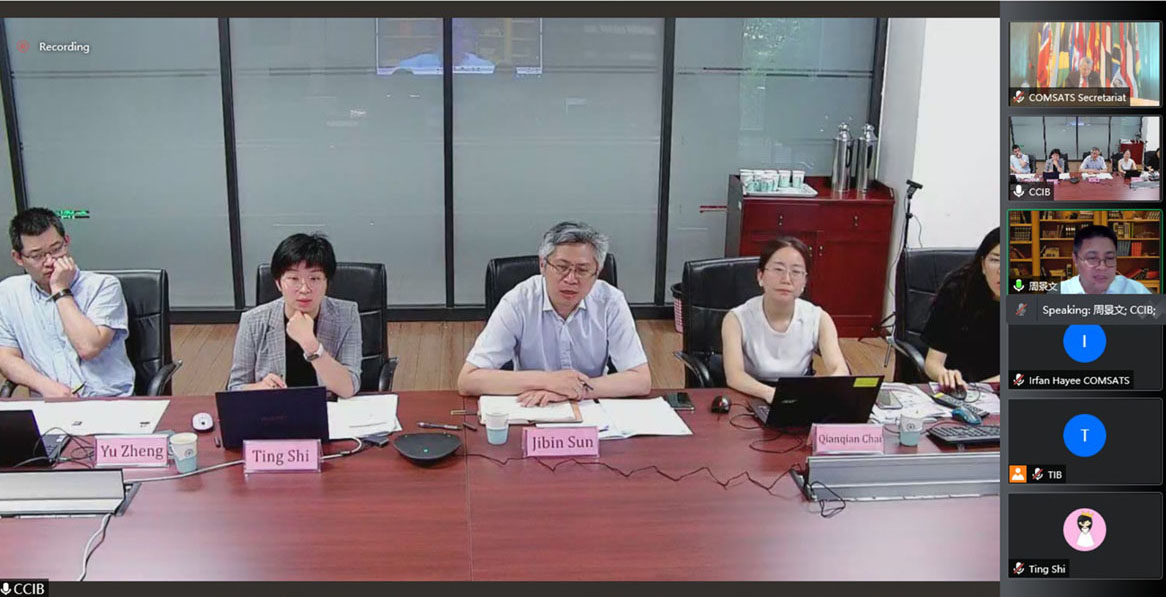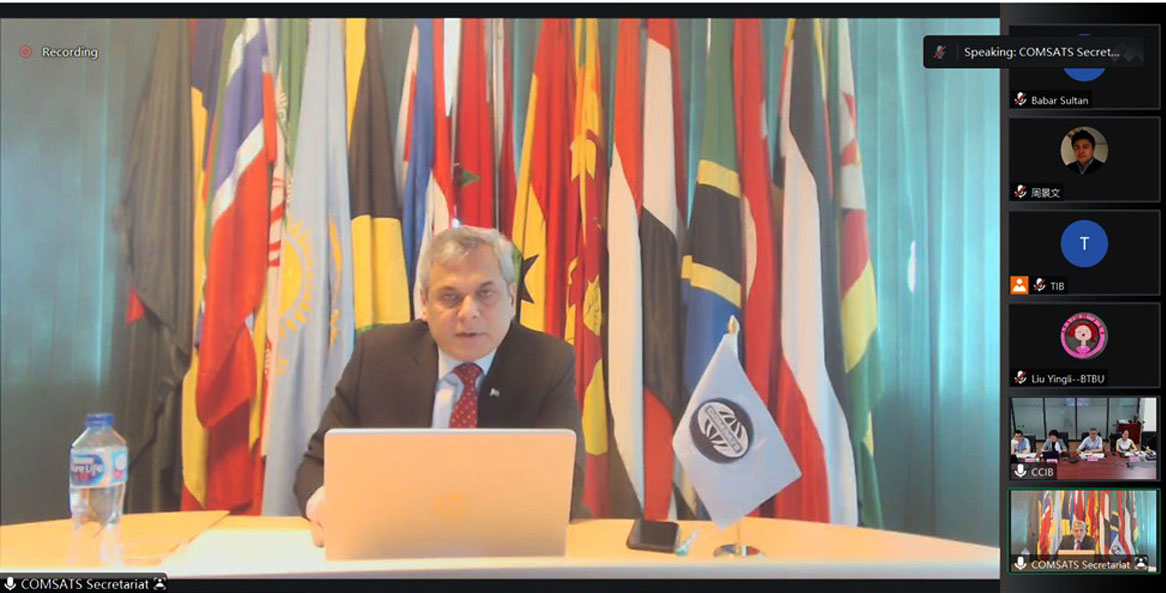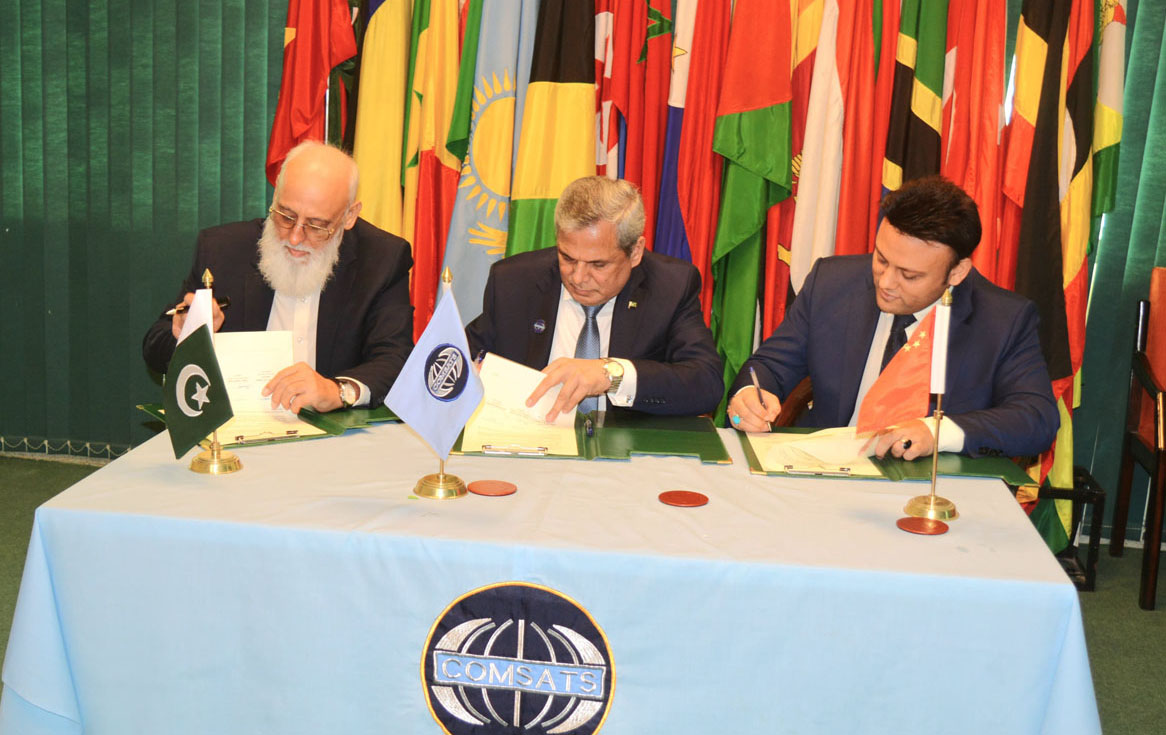On July 6, 2023, the Tianjin Institute of Industrial Biotechnology (TIB), in collaboration with COMSATS, organized a workshop titled ‘Green Biomanufacturing of Future Food’ from the platform of the COMSATS Joint Centre for Industrial Biotechnology (CCIB). Established in 2021, CCIB has been providing a fertile ground for forging collaborations in joint R&D and strengthening industrial biotechnology sector of the Member States. The Centre has so far hosted a series of five technical workshops in Synthetic Biotechnology in line with its thrust areas: Bio-medicine, Bio-agriculture, Biomaterials, Bio-chemicals and Bio-energy, thus driving forward the frontiers of industrial biotechnology.
This workshop was by CCIB’s Joint R&D Group on ‘Future Food’ with the aim of promoting the exchange of ideas and knowledge between representatives of R&D organizations and industry, and exploring potential cooperation opportunities for research & development and technology demonstration on future food.
The event brought together a diverse group of researchers, scientists, academicians, government officials/policy makers and entrepreneurs to explore the untapped potential of biomanufacturing of future food for achieving food security. About 50 participants belonging to various COMSATS’ Member States/ Centres of Excellence participated in and benefited from deliberations at the workshop. The event featured a keynote address by a subject expert from China, and five technical talks by resource persons from China, Pakistan, and Nigeria.
Opening the event, Prof. Dr. Jibin Sun, Director CCIB, who is also the Deputy Director-General TIB, extended a warm welcome to the subject experts and participants. He acknowledged the collaboration and support extended by COMSATS for holding this workshop. Prof. Sun gave an overview of the workshop’s objectives, that entailed facilitating multidisciplinary collaboration for addressing the pressing global challenges related to food security.
Highlighting the potential of biotechnology in revolutionizing food production, promoting environmental sustainability and economic viability, the Executive Director COMSATS, Ambassador Dr. Mohammad Nafees Zakaria, noted that cutting-edge biotechnology opens doors to new possibilities, such as soil-less farming methods, precision agriculture, and the utilization of novel ingredients derived from renewable sources. Amb. Zakaria underlined that “Food Security” is a common challenge and that climate change is posing adverse effects on food production, leading to crop failures and increased vulnerability, which ultimately affects food security and the livelihoods of small-scale farmers. He stressed the need for prompt and decisive action to foster sustainable practices that mitigate these challenges and ensure universal access to nutritious food. Amb. Zakaria also highlighted the role being played by CCIB in supporting industrial biotechnology sectors in COMSATS’ Member States. He commended the CCIB Director and Group Coordinator for their dedicated efforts in organizing the workshop, as well as acknowledged this timely and prudent initiative.
In his keynote address, titled ‘Future Food and Synthetic Biology’, Prof. Jingwen Zhou, Vice Dean of the Science Center for Future Foods at Jiangnan University, China, highlighted future food as a representative substance for future changes in production methods and lifestyles. He noted that objectives of biomanufacturing of future foods is to address issues such as food supply and quality, food safety and nutrition, and dietary habits, with characteristics such as safer, more nutritious, more delicious, and more sustainable. Prof. Zhou was of the opinion that the large-scale industrial application of synthetic biology technology will play an important role in the production of future food. Through synthetic biotechnology, efficient biosynthetic pathways can be constructed in microbial cells to achieve efficient synthesis of fermented foods, food enzymes, microbial proteins, important food ingredients, functional nutrients, artificial meat/eggs/milk, etc.
First talk of the technical session was made by Prof. Yu Zheng, Professor, Tianjing University of Science and Technology, China. Speaking on the topic of ‘Excavation of Core Microorganisms and Engineering of Microbiome for Intelligence Manufacturing of Traditional Vinegar’, he noted that due to the variability in microbial communities, fermentation process is primarily guided by empirical knowledge, leads to inconsistent fermentation and unreliable quality of product. Prof. Zheng stressed that in order to achieve controllable fermentation and enable future intelligent manufacturing of traditional vinegar, it is crucial to establish a stable and fully functional microbial community. Advancements in intelligent computing and high throughput screening technology have opened up possibilities for constructing an engineered microbiome through systematic analysis of the structure and function of microbial communities involved in traditional vinegar fermentation.
In her presentation, titled ‘Biosynthesis and Characteristics of Fibrinolytic Enzyme from Cordyceps Militaris’, Prof. Yingli Liu, Professor, Beijing Technology and Business University, China, shared her research on obtaining fibrinolytic enzyme gene from Cordyceps militaris that has the potential to be developed into a new generation of thrombolytic drugs and functional foods.
Prof. Hamid Mukhtar, Professor, Government College University Lahore, Pakistan, gave a talk on ‘Biotechnology for Functional Foods’, whereby he gave an overview of the recent advances in the applications of biotechnology for the development of different functional foods. Prof. Mukhtar noted that recently biotechnological innovations have re-shaped a number of industries especially agricultural, food and health industries. He also touched upon quality assurance, biosafety, social, legal and regulatory aspects of biotechnology-derived functional foods.
In her presentation titled ‘Probiotic Potential and Antioxidant Activities of Lactic Acid Bacteria Isolated from Some Nigerian Fermented Foods and Palm Wine’, Prof. Oladipo Iyabo Christianah, Professor, Ladoke Akintola University of Technology, Nigeria, shared her research on Lactobacillus species that were identified from some Nigerian fermented foods and palm wine, and their functional properties evaluated in order to better understand their usefulness as starter cultures or probiotics.
Prof. Ting Shi, Coordinator of CCIB Joint R&D Group on Future Food, in her talk on ‘Bio-manufacturing of Future Food Boosted by in-vitro Synthetic Biology’, noted that recently the advantages of in-vitro multi-enzyme molecular machines on the precise control of reaction process and the enhancement of product yield have demonstrated great application potential in biomanufacturing. She noted that Studies on in-vitro multi-enzyme molecular machines have become an important branch of synthetic biology, and are gaining increasing attentions.
Ms. Qianqian Chai, Officer of Foreign Affairs and Academic Exchange at TIB, China, made closing remarks. She expressed satisfaction on the success of the workshop in fostering meaningful discussions and nurturing multidisciplinary collaborations in the realm of future food. Ms. Chai expressed her gratitude to the esteemed experts and participating researchers for their active engagement and contributions. She made an important announcement regarding the hosting of the fourth International Training Course on Industrial Synthetic Biotechnology from the CCIB platform during November 2023.







